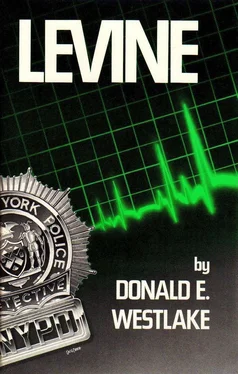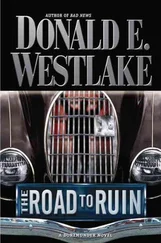Stonegell’s office door was locked, so Levine waited in the hall, watching students hurrying by in both directions, and reading the notices of scholarships, grants and fellowships thumbtacked to the bulletin board near the office door.
The professor showed up about fifteen minutes later, with two students in tow. He was a tall and slender man, with a gaunt face and a full head of gray-white hair. He could have been any age between fifty and seventy. He wore a tweed suit jacket, leather patches at the elbows, and non-matching gray slacks.
Levine said, “Professor Stonegell?”
“Yes?”
Levine introduced himself and showed his identification. “I’d like to talk to you for a minute or two.”
“Of course. I’ll just be a minute.” Stonegell handed a book to one of the two students, telling him to read certain sections of it, and explained to the other student why he hadn’t received a passing grade in his latest assignment. When both of them were taken care of, Levine stepped into Stonegell’s crowded and tiny office, and sat down in the chair beside the desk.
Stonegell said, “Is this about one of my students?”
“Two of them. From your evening writing course. Gruber and Perkins.”
“Those two? They aren’t in trouble, are they?”
“I’m afraid so. Perkins has confessed to murdering Gruber.”
Stonegell’s thin face paled. “Gruber’s dead? Murdered?”
“By Perkins. He turned himself in right after it happened. But, to be honest with you, the whole thing bothers me. It doesn’t make sense. You knew them both. I thought you might be able to tell me something about them, so it would make sense.”
Stonegell lit himself a cigarette and offered one to Levine. Then he fussed rather vaguely with his messy desktop, while Levine waited for him to gather his thoughts.
“This takes some getting used to,” said Stonegell after a minute. “Gruber and Perkins. They were both good students in my class, Gruber perhaps a bit better. And they were friends.”
“I’d heard they were friends.”
“There was a friendly rivalry between them,” said Stonegell. “Whenever one of them started a project, the other one started a similar project, intent on beating the first one at his own game. Actually, that was more Perkins than Gruber. And they always took opposite sides of every question, screamed at each other like sworn enemies. But actually they were very close friends. I can’t understand either one of them murdering the other.”
“Was Gruber similar to Perkins?”
“Did I give that impression? No, they were definitely unalike. The old business about opposites attracting. Gruber was by far the more sensitive and sincere of the two. I don’t mean to imply that Perkins was insensitive or insincere at all. Perkins had his own sensitivity and his own sincerity, but they were almost exclusively directed within himself. He equated everything with himself, his own feelings and his own ambitions. But Gruber had more of the — oh, I don’t know — more of a world-view, to badly translate the German. His sensitivity was directed outward, toward the feelings of other people. It showed up in their writing, ember’s forte was characterization, subtle interplay between personalities. Perkins was deft, almost glib, with movement and action and plot, but his characters lacked substance. He wasn’t really interested in anyone but himself.”
“He doesn’t sound like the kind of guy who’d confess to a murder right after he committed it.”
“I know what you mean. That isn’t like him. I don’t imagine Perkins would ever feel remorse or guilt. I should think he would be one of the people who believes the only crime is in being caught.”
“Yet we didn’t catch him. He came to us.” Levine studied the book titles on the shelf behind Stonegell. “What about their mental attitudes recently?” he asked. “Generally speaking, I mean. Were they happy or unhappy, impatient or content or what?”
“I think they were both rather depressed, actually,” said Stonegell. “Though for somewhat different reasons. They had both come out of the Army less than a year ago, and had come to New York to try to make their mark as writers. Gruber was having difficulty with subject matter. We talked about it a few times. He couldn’t find anything he really wanted to write about, nothing he felt strongly enough to give him direction in his writing.”
“And Perkins?”
“He wasn’t particularly worried about writing in that way. He was, as I say, deft and clever in his writing, but it was all too shallow. I think they might have been bad for one another, actually. Perkins could see that Gruber had the depth and sincerity that he lacked, and Gruber thought that Perkins was free from the soul-searching and self-doubt that was hampering him so much. In the last month or so, both of them have talked about dropping out of school, going back home and forgetting about the whole thing. But neither of them could have done that, at least not yet. Gruber couldn’t have, because the desire to write was too strong in him. Perkins couldn’t, because the desire to be a famous writer was too strong.”
“A year seems like a pretty short time to get all that depressed,” said Levine.
Stonegell smiled. “When you’re young,” he said, “a year can be eternity. Patience is an attribute of the old.”
“I suppose you’re right. What about girl friends, other people who knew them both?”
“Well, there was one girl whom both were dating rather steadily. The rivalry again. I don’t think either of them was particularly serious about her, but both of them wanted to take her away from the other one.”
“Do you know this girl’s name?”
“Yes, of course. She was in the same class with Perkins and Gruber. I think I might have her home address here.”
Stonegell opened a small file drawer atop his desk, and looked through it. “Yes, here it is,” he said. “Her name is Anne Marie Stone, and she lives on Grove Street, down in the Village. Here you are.”
Levine accepted the card from Stonegell, copied the name and address onto his pad, and gave the card back. He got to his feet. “Thank you for your trouble,” he said.
“Not at all,” said Stonegell, standing. He extended his hand, and Levine, shaking it, found it bony and almost parchment-thin, but surprisingly strong. “I don’t know if I’ve been much help, though,” he said.
“Neither do I, yet,” said Levine. “I may be just wasting both our time. Perkins confessed, after all.”
“Still—” said Stonegell.
Levine nodded. “I know. That’s what’s got me doing extra work.”
“I’m still thinking of this thing as though — as though it were a story problem, if you know what I mean. It isn’t real yet. Two young students, I’ve taken an interest in both of them, fifty years after the worms get me they’ll still be around — and then you tell me one of them is already worm food, and the other one is effectively just as dead. It isn’t real to me yet. They won’t be in class tomorrow night, but I still won’t believe it.”
“I know what you mean.”
“Let me know if anything happens, will you?”
“Of course.”
Anne Marie Stone lived in an apartment on the fifth floor of a walk-up on Grove Street in Greenwich Village, a block and a half from Sheridan Square. Levine found himself out of breath by the time he reached the third floor, and he stopped for a minute to get his wind back and to slow the pounding of his heart. There was no sound in the world quite as loud as the beating of his own heart these days, and when that beating grew too rapid or too irregular, Detective Levine felt a kind of panic that twenty-four years as a cop had never been able to produce.
Читать дальше






